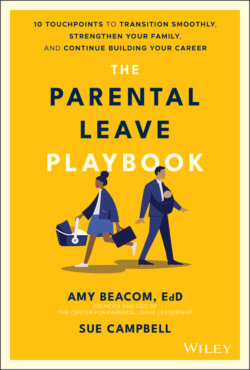Читать книгу The Parental Leave Playbook - Sue Campbell - Страница 40
Stats: Moms versus Dads
ОглавлениеHow Parenthood Affects Employment
56% of mothers and 50% of fathers say juggling work and family life is difficult.1
Childcare and family obligations are the top reason keeping women “of prime age” (25–54) from working in formal employment. For men of the same age, the top reason for not working is health limitations, followed by inability to find work.2
46% of women and 23% of men list childcare or other family obligations as a reason they are not working.3
Full Time, Part Time, or No Time
76% of people think full-time work is ideal for fathers; only 33% say the same for mothers.4
96.2% of employed fathers work full time; 78.5% of employed mothers work full time.5
39% of people who believe one parent should not work full time say the mother should be the one to not work, or to work part time, as compared to 5% who say the stay-at-home (or part-time) parent should be the father.6
Mompreneurs
80% of mompreneurs started their business after having children, with 69% citing flexibility as the top advantage of having their own business and 71% indicating they are the primary childcare provider.7
Involved Parenting
80% of women and 74% of men believe that women face a lot of pressure to be an involved parent; 43% of women and 56% of men believe the same of men.8
When both parents work, moms are more likely to take on more responsibility for sick children (47% moms versus 6% dads) and to be responsible for managing children's schedule and activities (54% moms versus 39% dads).9
The Value of Our Contributions
Society puts greater value on men's contributions at work (53%) versus home (5%) and conversely greater value on women's contributions at home (28%) versus work (15%). There is a higher expectation that women contribute in both arenas (56%) as compared to men (41%).10
Parenthood Bias
27% of mothers and 20% of fathers have been treated as if they were not committed to their work.11
19% of mothers and 14% of fathers have been passed over for an important assignment.12
19% of mothers and 13% of fathers have been passed over for promotion.13
Driving the Point Home
Having a baby changes the brain! Pregnancy and the postpartum period are associated with physiological and neurological restructuring changes for moms14 and dads.15
